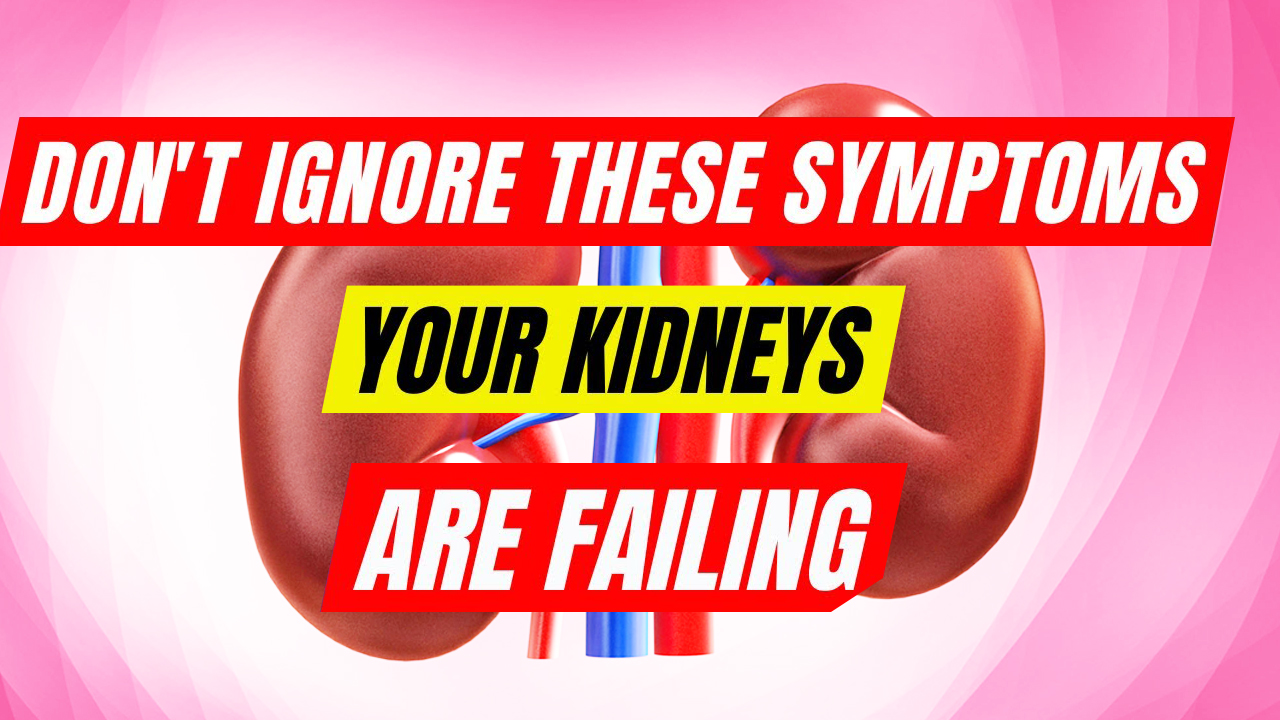13 Warning Signs Your Kidneys Are Failing – Don’t Ignore These Symptoms, One of the most frightening diseases, kidney disease, affects almost 37 million individuals in the United States. The worst part is that symptoms may not appear until up to 90% of renal function has been lost.
The symptoms frequently go unnoticed until the kidneys are close to failure. The goal is to control it at stage one, and for that, you must all be aware of the early signs and symptoms of kidney disease, so you do not confuse them for symptoms of less severe conditions or ignore them entirely. So let’s discuss 13 common signs that you should watch out for.
#1. Fatigue and weakness
Warning Signs of Bad Kidneys
Fatigue and weakness are common symptoms of kidney failure because the kidneys play a vital role in maintaining the body’s overall health and balance. When kidneys are not functioning properly, they can no longer effectively remove waste and excess fluids from the body, which leads to toxins in the blood, making you feel tired and weak. Additionally, kidney failure also causes a decrease in the levels of a hormone called erythropoietin, which regulates the production of red blood cells.
This leads to anemia, which can cause fatigue and weakness. However, keep in mind that fatigue and weakness can be a sign of kidney failure, but they can also be caused by a variety of other factors, such as a lack of sleep, poor diet, or just being a little lazy. So before you start worrying about your kidneys, try getting a good night’s sleep and eating a balanced meal. And if you suspect that you may have a kidney problem, it is best to consult a doctor to get checked out.
#2.Foam in urine
When your kidneys are not functioning at their best, they can’t filter the blood as effectively, and all the good stuff, like proteins and other important molecules, just end up in your urine. That’s where the foam comes in; the proteins in the urine can make it all bubbly and frothy. This condition is called proteinuria. It is important to note that foamy urine is not always caused by kidney failure; other things like a high urine flow rate can also create bubbles in the urine and make it foamy. If it is accompanied by other symptoms such as fatigue, swelling, or changes in urination, make an appointment with your doctor.
#3.High blood pressure
Kidneys are like the body’s own blood pressure control center. They produce hormones that help regulate the body’s balance of fluids and electrolytes, which affect blood pressure. So when the kidneys are not working properly, it is like the control center went on strike. The hormones that usually keep the blood pressure in check can’t do their job, leading to the blood pressure going haywire.
This increase in blood pressure can put a lot of strain on the kidneys and exacerbate the underlying kidney problem. It is like a vicious cycle, high blood pressure makes the kidneys work harder, and it makes the kidneys malfunction leading to a further increase in blood pressure.
#4. Shortness of breath
Kidney failure can cause shortness of breath because of the buildup of toxins, such as urea, in the bloodstream, which transforms into ammonia, leading to confusion, headaches, and shortness of breath. Additionally, kidney failure also causes anemia, which occurs when there are not enough red blood cells to transport oxygen to the body’s Tissues.
This can lead to shortness of breath, fatigue, and weakness. Furthermore, fluid retention caused by kidney failure causes fluid buildup in the lungs, leading to shortness of breath.
#5. Persistent bad breath
A variety of things can cause bad breath, but persistent bad breath could be an indicator of kidney failure. When the kidneys are not functioning properly, waste products and toxins build up in the bloodstream, which can cause an ammonia-like odor on the breath.
Additionally, kidney failure can also cause a buildup of urea, a compound produced by the liver and excreted by the kidneys. High levels of urea in the bloodstream cause an unpleasant smell on the breath. So, if you have tried freshening your breath with mints, gum, and brushing your teeth and it persists, it is worth checking with your doctor.
warning signs of kidneys, warning signs of bad kidneys, warning signs of failing kidneys, warning signs of damaged kidneys, 7 warning signs of toxic kidneys, signs to look out for kidney problems, warning of kidney failure, warning signs of kidney trouble, warning signs of kidney problems, warning signs of kidney issues, warning signs of kidney and urinary tract disease, warning signs of a kidney infection, warning signs of a kidney stone, early signs of kidney and liver problem, early signs of kidney and liver failure, early signs of kidney stones
POST TAG
#6.Lack of concentration
When the kidneys are not working properly, the toxins and waste products that should have been filtered out end up lingering in the bloodstream, and when those toxins linger for too long, they can make their way to the brain, much like when you are stuck in a room with a stinky trash bin, and it is hard to focus on anything else. The same goes for the toxins in the brain; they make it hard for you to concentrate.
It is like the kidneys are the janitors of the body, keeping things clean, and when they go on strike, the waste builds up and starts affecting the rest of the body, including the brain. So if you are finding it hard to focus, it might be worth checking in with your kidneys and seeing a doctor to rule out any underlying issues.
#7. Difficulty sleeping
Kidneys play a role in regulating hormones, and when they fail, it can lead to an imbalance of hormones such as erythropoietin and renin, leading to insomnia. Also, kidney failure is commonly associated with a buildup of waste products, such as urea and creatinine, which can cause discomfort and make it harder to fall asleep.
It is like trying to fall asleep with a really full bladder; your body is not comfortable, so it is hard to fall asleep. Additionally, some people with kidney failure may also experience sleep apnea, a condition in which a person’s breathing is interrupted while they sleep, making it difficult to get a restful night’s sleep.
#8. Nausea and vomiting
When the kidneys fail to filter the blood properly, it leads to a buildup of waste products like urea, creatinine, and toxins that can cause nausea and vomiting. It is like when you eat something that’s gone bad, your stomach can’t handle it, and it makes a hasty exit. The same goes for the toxins in the stomach, and they make a hasty exit through the mouth. Kidney failure also affects the balance of electrolytes in the body, leading to an upset stomach and vomiting.
#9. Itchy skin
Kidney failure can cause itchy skin due to the accumulation of waste products in the Bloodstream. When the kidneys are not functioning properly, they cannot filter and effectively remove waste products, toxins, and excess fluids from the bloodstream. As these waste products continue to build up, they cause an itchy sensation on the skin, known as uremic pruritus. Also, the imbalances of electrolytes and minerals in the body occur when the kidneys are not functioning properly. These imbalances affect the skin, leading to itching and dryness.
#10. Muscle cramps
The kidneys play an important role in regulating the balance of electrolytes in the body. When the kidneys are not working properly, the levels of these electrolytes become imbalanced, leading to muscle cramps. For example, potassium is an essential mineral that plays an important role in muscle function.
In healthy individuals, the kidneys regulate potassium levels in the blood by filtering and excreting excess potassium. When the kidneys are not working properly, potassium levels elevate, leading to muscle cramps, weakness, and even cardiac arrhythmias. In addition, muscle cramps may also be caused by dehydration and uremia, a condition caused by high levels of waste products in the blood due to kidney failure.
#11. Swelling in the legs, ankles, and feet
When the kidneys are not working properly, they can’t filter the blood effectively, and all the fluids and waste products that should have been filtered out end up building up in the body. And when those fluids build up, it can cause swelling in the legs, ankles, and feet. It is like when you have been standing in one spot for too long, the fluids in your legs start to pool, and you get that “cankle” Look.
A similar thing happens when the kidneys fail, they can’t pump the fluids out of the legs, and they pool up, causing swelling. So, in short, swelling in the legs, ankles, and feet could be a sign of kidney failure, but it is not a definite diagnosis, and it is important to visit a doctor to identify the underlying cause of the issue.
warning signs of kidney stone attack, early signs of renal artery stenosis, early signs of a kidney problem, early signs of acute kidney failure in dogs, what are warning signs of bad kidneys, what are the signs of kidneys going bad, what are some of the symptoms of a bad kidney, what are warning signs of kidney problems, early signs of kidney blockage, early signs of bad kidneys, early signs of kidney failure back pain
POST TAG
#12. Frequent urination
When the kidneys are not working properly, they may not be able to properly regulate the balance of fluids in the body, leading to an increased need to urinate. Think of it like when you are trying to make a long road trip, and you are always looking for the next gas station,
your bladder is doing the same thing when the kidneys are on strike, and it is always looking for the next bathroom break. Additionally, kidney failure can also cause other issues, such as increased urine production or difficulty holding urine, which contributes to an increased frequency of urination.
#13. Pain in the kidney area
Kidney failure causes pain in the upper back, just below the rib cage, on either side of the spine. The pain may be constant or intermittent, often accompanied by other symptoms such as fever, chills, nausea, and vomiting. So if you are experiencing pain in the kidney area and suspect it could be related to kidney failure, consult a qualified medical professional. They will perform a thorough physical examination, ask questions about your symptoms, and run some tests.
This will help them determine the underlying cause of your pain and provide an accurate diagnosis and appropriate treatment. If you have any of these signs, don’t panic! But also don’t ignore it; better be safe than Sorry. Early detection and treatment of kidney failure can prevent further kidney damage and improve your overall quality of life. Remember, the kidneys play a vital role in our body, and keeping them healthy is crucial for overall well-being. So, if you have any suspicion, never hesitate to consult a medical professional.
Do you find this Blog informative or helpful? Let us know in the comment section below. Stay Healthy.
please let me know in the comment section below, please.
Share and stay healthy.
Thank you!
Read More:
PDF Book: Click Here
If you need more informative posts like this, you can follow me on Facebook page and YouTube channel. Below is the link.
Thank you……….!



